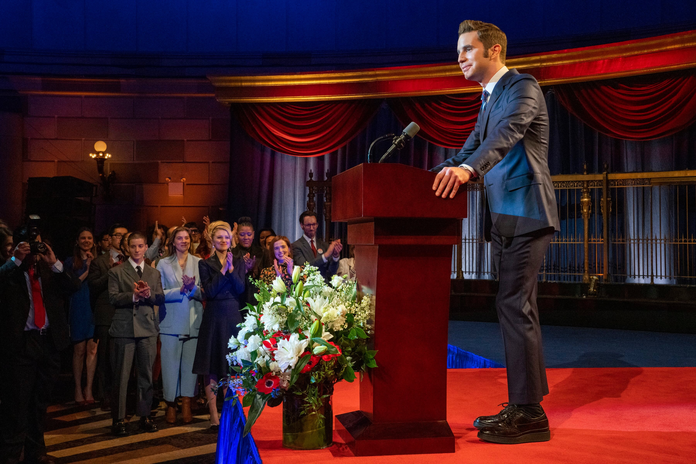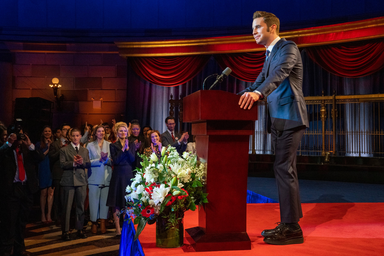Though this summer didn’t boast the magical picnics and outside IG snaps we may have hoped for, there are ways to distract yourself from the scary reality of a pandemic. Personally, I delved into the wonderful world of streaming services. While some shows took me to alternate realities, some hit closer to home. Season two of The Politician proved to be both a way to relax and continue my education on all things political.
The Ryan Murphy-directed series debuted on Netflix in 2019. It stars Ben Platt as Payton Hobart, a young man on his rise to political fame first as a candidate for class president, and then for New York State Senate as representative of the 27th District in Albany. The first season follows Payton and his campaign team as he runs for class president at his high school in Santa Barbara, CA while balancing college applications, the death of a close friend, and a family health crisis. In the second season, we pick up where we left off: Payton having lost the student election, but attending NYU and planning a new campaign at a higher level.
Crisp and vibrant visuals paint Payton as a privileged student determined to be commander-in-chief of the United States, while grappling with the ethics of engaging in slimy politics. The phenomenal cinematography of both seasons is not it’s only appeal. The plot of season two in particular touches on themes that are relevant today, as the U.S. gears up for Election Day this November.
Local and national elections share a connection
Structurally speaking, each season follows Payton and his campaign staff –– campaign managers and advisors McAfee Westbrook (Laura Dreyfuss), James Sullivan (Theo Germaine) and Skye Leighton (Rahne Jones), who Payton ran against in season one. The first season’s campaign is small since it’s at an academic level while in season two, the stakes grow to a local level in New York. I don’t want to spoil anything about the ending, so I’ll just say that season three will show us more of Payton’s career growth.
The trajectory Payton’s career takes is particularly relevant as voters across the country are realizing the importance of voting in local elections as well, not just primary and presidential elections. Those who support Payton’s agenda follow him through his path up the political ladder. Voting in local elections allows voters to figure out who’s up-and-coming careers have sound platforms they want to support. Voter support permits aspiring candidates to gain more experience, and thus your faves have an advantage when running for more prestigious roles in D.C.
Related: It’s so Important to Vote, Even if it’s for the ‘Lesser of Two Evils’
Politicians and public perception
Voting in 2020 isn’t the only take away The Politician alludes to in the second season. Payton is running against incumbent Dede Standish (Judith Light) for NY District 27 representative. McAfee, James, and Skye compete against Dede’s campaign manager, Hadassah Gold (Bette Midler), to reveal damaging gossip about their prospective opponents. This back-and-forth is very much reminiscent of cancel and call-out culture, which is often prevalent on social media and gossip pages which competing politicians use to their advantage.
Payton and his staff try to reveal to the public Dede’s polyamorous marriage to her husband Marcus Standish (Joe Morton) and their boyfriend William War (Teddy Sears). Ironically, this is happening while Payton himself becomes involved in a throuple with his longtime girlfriend Alice Charles (Julia Schlaepfer) and their high school acquaintance Astrid (Lucy Boynton). Both throuples must deal with the rumors which result.
There’s also an episode titled “Cancel Culture” which reveals Payton wearing a Halloween costume of Apache leader Geronimo. Payton gives a speech apologizing for and denouncing his actions, with Skye, who is Black, by his side which she (and the audience) feel is tokenizing. This follows a convoluted storyline as the audience tries to figure out who leaked the original childhood photo, and a second, more recent photo of Payton in a speedo and headdress. Regardless, the throughline of this episode is the nuances of cancel culture and whether or not politicians can, or should, come back from being called out for their problematic actions.
Related: 10 TV Shows with Black Leads That You Need to Be Watching Right Now
Climate change is not a fictional theme
In the same episode, there’s a subplot following Infinity Jackson (Zoey Deutch) on her quest to lead a waste and toxic-free life after escaping her grandmother who, in season one, made Infinity believe she had cancer. Although some of Infinity’s lifestyle choices are a bit “much” depending on who you ask – such as using leftover shower water to make her coffee – her passion to save the environment puts climate change at the forefront of the show. In fact, Payton takes on the global crisis as the primary project in his campaign. While Payton struggles to hop on the cold-shower train, Infinity’s veganism, reusable straws, and reusable containers for nuts and legumes perfectly capture millennial and Gen Z trends which have become popular.
But the show makes a point that climate change isn’t just a “popular” cause someone should post about on their Instagram, but incorporate into their everyday lives by recycling, avoiding plastic, and commuting by train or bike.
The generational divide can be closed
In episode five of the season, Standish supporter Andi Mueller (Robin Weigert) and her Payton-supporting daughter Jayne Mueller (Susannah Perkins) discuss who they’ll vote for in the polls –– Andi being a boomer and Jayne being a Gen Z’er. Both are passionate about politics, but their characters are a metaphor for the generational divide between many voters, especially on an issue such as climate change.
Fiona Noonan, an International Relations major at Connecticut College, tells Her Campus that this generational divide between children and their parents is particularly relatable today, as many are having conversations surrounding racism, Black Lives Matter and police brutality. She also explains that there’s a generational divide between politicians themselves, which we see exemplified in Payton and Dede. An exception is Payton’s mother Georgina Hobart (Gwyneth Paltrow), who becomes the first female president in the show and is known for her environmental progressivism.
Related: Everything You Need To Know About Kanye West’s Run For Presidency –– Including Why It’s So Dangerous
The Politician touches on more than just the themes listed above –– let’s not forget about voting fraud in Payton’s election, which is an uncanny metaphor to the USPS right now, and voting by-mail during the pandemic. Not to mention the series has been critiqued as too cynical, guilty of romanticizing an egocentric politician’s rise to greater power. It suggests Payton’s toils with morality and stances on issues solely for voter gains are positive realities. Despite these failures of the show, the series is a satire that is a perfect allegory of the current political climate.





